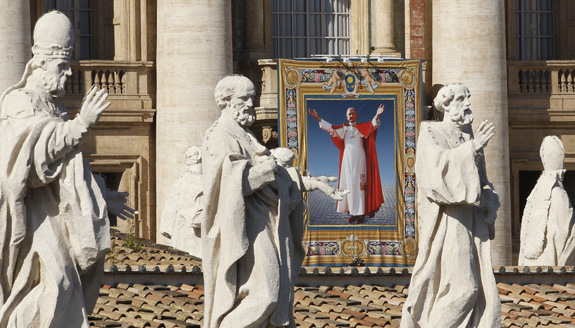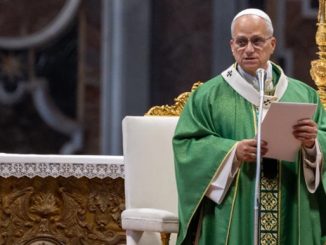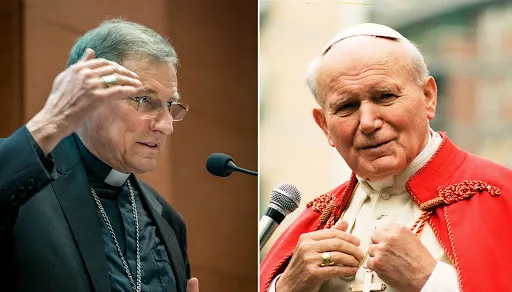
July 25 is the fiftieth anniversary of Humanae Vitae, Blessed Paul VI’s encyclical on the integrity of love and the appropriate means of family planning. Issued during the cultural meltdown of the 1960s, and in a year when irrationality stalked the entire Western world, Humanae Vitae instantly became the most vilified act of the papal magisterium in history. And to what should have been their shame, entire national episcopates distanced themselves from Pope Paul’s teaching by a variety of stratagems, many of which exhibited some degree of theological confusion and some of which were downright cowardly.
Paul VI came to the judgment he did in Humanae Vitae for two reasons.
First, because he was convinced that using the natural rhythms of fertility to regulate births was the most humanistic means of family planning, and the method most congruent with the dignity of the human person — and especially the unique dignity of women.
And second, because he came to understand that many of those advocating a change in Catholic teaching on the morally acceptable means of family planning were in fact promoting a fundamental change in the Church’s way of moral reasoning: They denied that some acts are simply wrong because of their nature, and they argued that moral judgment is really a calculus of intentions, acts, and consequences. Had that “proportionalism,” as it’s technically known, been enshrined as the official Catholic method of making moral judgments, Catholicism would soon have found itself in the sad condition of liberal Protestantism — another Christian community with utterly porous moral boundaries.
His abandonment by a lot of the world episcopate deeply wounded Paul VI, a sensitive soul who had supported the Second Vatican Council’s affirmation that bishops are something more than local branch managers of Catholic Church, Inc., and who probably thought he was owed a little loyalty in return. So as the Church and the world mark the golden jubilee of Humanae Vitae, and as Catholics around the world prepare to celebrate the canonization of Paul VI in October, perhaps those bishops who understand that a serious breach in episcopal collegiality took place in 1968, when so many of their predecessors failed to defend the Bishop of Rome against his often-vicious critics, might consider making these affirmations about the encyclical, in one form or another:
- I am deeply grateful to Pope Paul VI for his courageous witness to the truth about love in the encyclical Humanae Vitae. With Pope Francis, I believe that Paul VI “had the courage to stand against the majority, to defend moral discipline, to exercise a ‘brake’ on culture, [and] to oppose [both] present and future neo-Malthusianism,” which treats the gift of children as a societal and economic burden.
- I believe that the truths taught by Humanae Vitae on the appropriate means to plan a family are important for human well-being today; that conscious use of artificial means of regulating fertility distorts the truth about human love inscribed into Creation by the Creator; and that conscience must respect these intrinsic truths in family planning.
- I believe that the truths taught by Humanae Vitae about natural family planning have proven themselves in pastoral situations around the world; that those truths have made significant contributions to family ministry and marriage preparation in various cultures; and that those who deny the human capacity to understand and live the disciplines of natural family planning often engage in racism, new forms of colonialism, or both.
- I believe that the “contraceptive culture” of which Paul VI prophetically warned in Humanae Vitae, and the related abortion license, are major factors in the sexual abuse of women that has come to public attention through the #MeToo movement; and I invite feminists to rethink their celebration of artificial contraception and abortion on this 50th anniversary.
- I believe that St. John Paul II’s “Theology of the Body” has given the Catholic Church a compelling tool for explaining both the truths taught by Humanae Vitae and the unhappiness caused by the sexual revolution.
- I pledge to make this anniversary year an occasion to celebrate the gift of Humanae Vitae and to use my pastoral office to deepen understandings of the Catholic sexual ethic as a celebration of human dignity and the gift of life.
If you value the news and views Catholic World Report provides, please consider donating to support our efforts. Your contribution will help us continue to make CWR available to all readers worldwide for free, without a subscription. Thank you for your generosity!
Click here for more information on donating to CWR. Click here to sign up for our newsletter.










It would be nice, but don’t hold your breath. And I believe it incorrect to say the Church is celebrating the 50th anniversary of HV. Some pockets are, but as a whole, no. No mention in my diocese, or the next one north of us, but one down south there is a statement on the website.
Two missing words almost universally missing in the overall discussions : “continence” and “generosity”. They strike fear in the hearts of the “planners”.
As a matter of fact, the US episcopate has produced a wonderful guide affirming HV. Of course, the US bishops supported Paul VI in 1968. Far more amazingly, the Canadian bishops (major dissenters in 1968) have likewise produced a supportive document this time around.